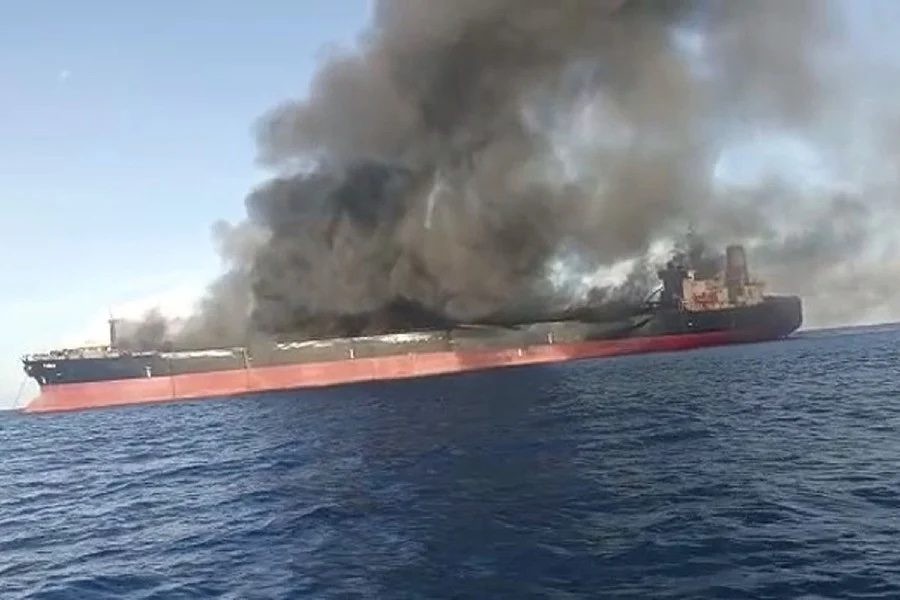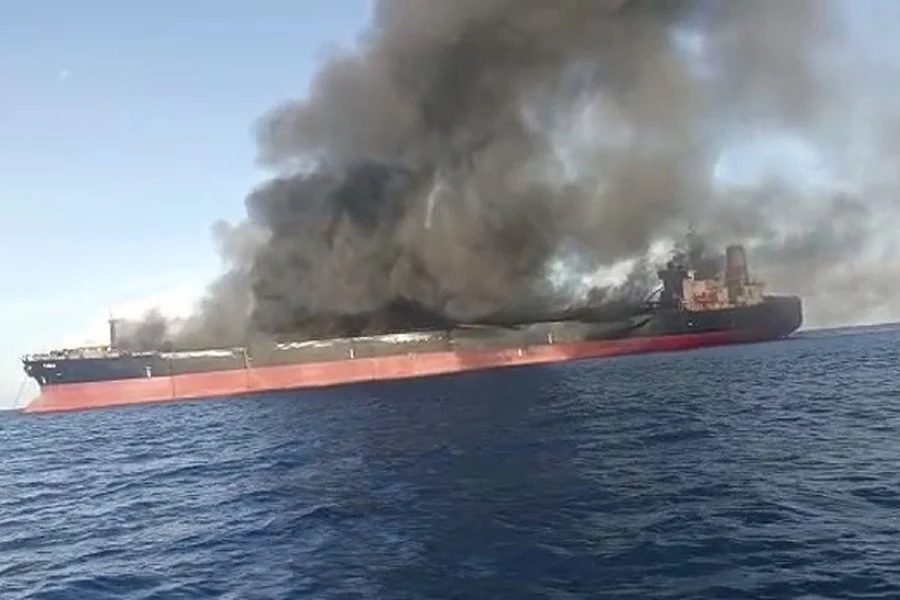在马来西亚海岸外,世界上最繁忙的航运通道之一,老旧的油轮“巴勃罗”号(Pablo)发生爆炸,像沙丁鱼罐头一样撕裂了甲板,引发了大火,黑色的烟雾直冲云霄。
这是一场悲剧性的事故,可能会酿成更大的灾难。这艘在加蓬注册的船,能运载70万桶原油,在中国卸货后正穿过南中国海,所以几乎是空的。官方报告说,在28名国际船员中,有25人被过往船只救起。爆炸发生在新加坡拥挤的水域附近。
但对附近的海事当局来说,头痛才刚刚开始。几乎没有证据表明船东是一家在马绍尔群岛注册的公司,其船队中没有其他船只,也没有保险的痕迹。两者对于清理工作的开始都至关重要。
去年,在伊朗海域发现了一艘阿夫拉玛级原油油轮,这凸显了在全球范围内运输受制裁石油的黑暗船队扩张所带来的风险。自俄罗斯入侵乌克兰之后的一系列制裁——包括七国集团为限制石油现金流入克里姆林宫而实施的价格上限——以来,石油交易界的观察人士报告称,有未透露姓名的买家购买了数百艘旧油轮。
由于这艘船在距离马来西亚廷吉岛仅40海里的地方被烧毁,目前还没有人对其负责。据报道,可能来自沉船的石油被冲抵印尼。
“巴勃罗号的事故是一个悲剧,它清楚地提醒了我们一直在说的话:影子船队对人们的生命和海洋环境都构成了严重威胁,”Gard AS首席执行官罗尔夫·托雷·罗佩斯塔德(Rolf Thore Roppestad)说。Gard AS是最大的保护和赔偿俱乐部,为世界上大部分船队提供石油泄漏等风险的保险。
“让我担心的是,每天都有这样的船只通过交通繁忙的海峡,”他补充道。“因此,发生更多类似事故的可能性实际上相当高。”
火灾的原因尚不清楚,但可能是石油货物残留的蒸汽造成的。无论如何,当像巴勃罗号这样的船只爆炸时,清理混乱的过程变得更加困难。通常,保险公司、救助公司和各种中介机构会在事故发生后的几个小时内开始处理这种情况。
但在爆炸发生近一周后,几乎没有迹象表明这家保险公司将推动这一进程。“巴勃罗”号不在投保船只的行业数据库中,马来西亚海事执法机构(Malaysian Maritime Enforcement Agency)也没有回答有关保险的问题。
在船东未知的情况下,地方当局通常会向船员施压,要求他们提供更多信息,因为他们是少数知道船只订单来源的人之一。目前尚不清楚这是否可行。
新加坡律师事务所Oon & Bazul LLP及其关联的马来西亚办事处TS Oon & Partners LLP的创始合伙人Oon Thian Seng表示,如果无法联系到船东,地方当局可以扣押这艘船,尽可能弥补损失。然而,卖烧焦的巴勃罗的船体来支付***的费用是极不可能的。
巴勃罗和其他类似的船舶所面临的危险从其历史中可见一斑。这艘油轮悬挂的是加蓬国旗,加蓬是一个非常小的船舶注册地,不属于为促进安全航运而设立的巴黎谅解备忘录(Paris MoU)。它建于1997年,这意味着它远远超过了大多数油轮作为废料出售的年龄。
此外,如果是巴勃罗号最近一次装载的货物,那将是美国制裁的一次重大石油泄漏。
彭博社监测的船舶跟踪数据显示,这艘油轮在上海附近的一家造船厂停留了两个月,但在此之前,它的最后两次航行是向中国山东省的港口运送原油。数据分析公司Vortexa认为这两批货物都是受制裁的伊朗重质原油。
新加坡是世界上最繁忙的航运枢纽之一,对于新加坡当局来说,问题是如何保持合法的石油货物运输,同时避免类似事故的发生。菲律宾海事和港口管理局(Maritime and Port Authority)表示,已请求该地区20艘船只提供协助,报告发现“巴勃罗”号上三名失踪船员的情况,并表示没有对交通造成干扰。官员们没有进一步置评。
马来西亚当局表示,由于没有发现任何船员的迹象,他们于周五晚上暂停了搜索行动。爆炸使得这艘船无法安全登船,暂时滞留在该国的海岸线外。
它在那里停留的时间越长,就越能明显地提醒人们,随着影子舰队的扩张,风险也会随之而来。
Roppestad说:“不幸的是,付出代价的是船员、他们的家人和沿海社区。”。
–在Ann Koh、Ravil Shirodkar、Eko Listiyorini、Norman Harsono、Alaric Nightingale和Julian Lee的协助下。
▲Photo courtesy Malaysian Maritime Enforcement Agency
英文原文
Off the coast of Malaysia, in one of the world’s busiest shipping channels, an explosion on board the aging oil tanker Pablo ripped off its deck like a sardine can and began a fire that sent dark plumes of smoke into the sky.
It was a tragic accident that could have been a much larger catastrophe. The Gabon-registered ship, capable of carrying some 700,000 barrels of crude oil, was coming through the South China Sea after offloading a cargo in China — and so was nearly empty. Out of its international crew of 28, officials report that 25 were rescued by passing vessels. The blast happened just beyond Singapore’s congested waters.
But for nearby maritime authorities, the headache has just begun. There is little evidence of the owner, a Marshall Islands-registered company whose fleet contains no other ships, and no trace of insurance. Both are vital for a clean-up to begin.
An Aframax-class crude oil tanker observed in Iranian waters last year, the Pablo underlines the risks that come with the expansion of a dark fleet of aging vessels moving sanctioned oil around the globe. Since the wave of sanctions that followed Russia’s invasion of Ukraine — including the price caps imposed by the Group of Seven, intended to limit oil cash going back to the Kremlin — observers in the oil trading community have reported the purchase of hundreds of old tankers by undisclosed buyers.
With limited details on who is responsible for this vessel, there has been no one to hold to account as it burned just 40 nautical miles off Malaysia’s Pulau Tinggi island. Oil, potentially from the wreck, has been reported washing up on Indonesian cost.
“The Pablo casualty is tragic, and a stark reminder of what we have been saying all along: the shadow fleet poses a serious threat both to people’s lives and to the marine environment,” said Rolf Thore Roppestad, chief executive officer of Gard AS, the largest of the protection and indemnity clubs that insure much of the world’s fleet against risks such as oil spills.
“What worries me is that there are ships like these passing through high-traffic straits every day,” he added. “So the likelihood of more accidents like this happening is actually quite high.”
The cause of the fire is still unclear, though it’s possible vapors from the remains of the oil cargo played a part. Regardless, when ships like the Pablo explode, the process of cleaning up the mess gets more difficult. Often, insurance companies, salvage businesses and various intermediaries begin dealing with the situation within a few hours of it happening.
But almost a week after this explosion, there is little sign of the insurer to get the process moving. The Pablo is not listed in an industry database of insured vessels, and the Malaysian Maritime Enforcement Agency did not answer questions on insurance.
In instances where shipowners are unknown, local authorities will often press the crew for more information as they are one of the few people who know where a vessel’s orders are coming from. It is unclear whether that has been possible.
If the owner can’t be contacted, local authorities can seize the ship and try to cover what costs they can, according to Oon Thian Seng, founding partner of Singapore law firm Oon & Bazul LLP and at its associated Malaysian office, TS Oon & Partners LLP. However, it’s highly unlikely that selling what’s left of the charred Pablo would cover the costs of removal.
The dangers the Pablo, and others like it, are clear from its history. The tanker was flying the flag of Gabon, which is a very small destination for vessel registration and falls outside of something called the Paris MoU, set up to promote safe shipping. It was built in 1997, meaning it’s far beyond the age at which most tankers are sold as scrap.
Further, had the Pablo been laden with its most recent cargo, that would have been a major spill of oil sanctioned by the US.
The tanker spent two months at a shipyard near Shanghai, but before that its last two voyages were to deliver crude to Chinese ports in Shandong province, ship tracking data monitored by Bloomberg show. Data analytics firm Vortexa identifies both cargoes as Iranian heavy crude, which is sanctioned.
For authorities in Singapore, one of the world’s busiest shipping hubs, the question is how to keep legitimate oil cargoes moving — while avoiding accidents like this one. The Maritime and Port Authority said it had requested the assistance of 20 vessels in the region to report any sighting of the Pablo’s three missing crew, and reported no disruption to traffic. Officials did not comment further.
Malaysian authorities said they suspended search operations on Friday evening as efforts haven’t turned up any sign of the crewmen. The explosion has made the ship unsafe to board, leaving it stuck off the country’s coastline for the time being.
The longer it stays there, the longer it remains a visible reminder of the risks that come with an expanding shadow fleet.
“Sadly, it’s the crew, their families, and the coastal communities that are paying the price,” Roppestad said.
–With assistance from Ann Koh, Ravil Shirodkar, Eko Listiyorini, Norman Harsono, Alaric Nightingale and Julian Lee.
免责申明:本文来自G Cpatain,如有误差,以英文为准,仅代表作者观点,不代表中国海员之家立场。其真实性及原创性未能得到中国海员之家证实,在此感谢原作者的辛苦创作,如转载涉及版权等问题,请作者与我们联系,我们将在第一时间处理,谢谢!联系邮箱:cnisu@54seaman.com


 联系我们人工客服
联系我们人工客服



















 :1391995811
:1391995811


评论 (0人参与)